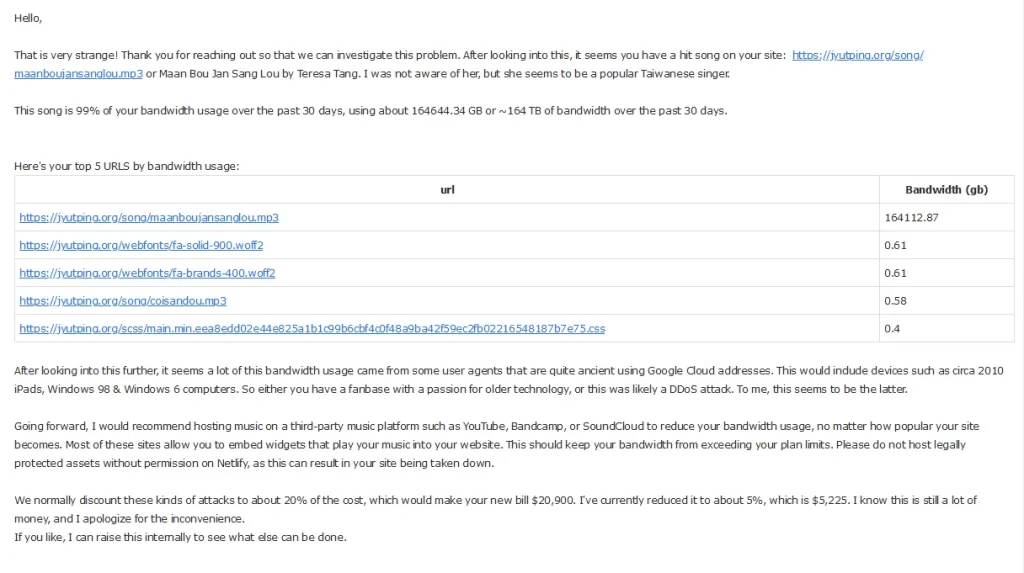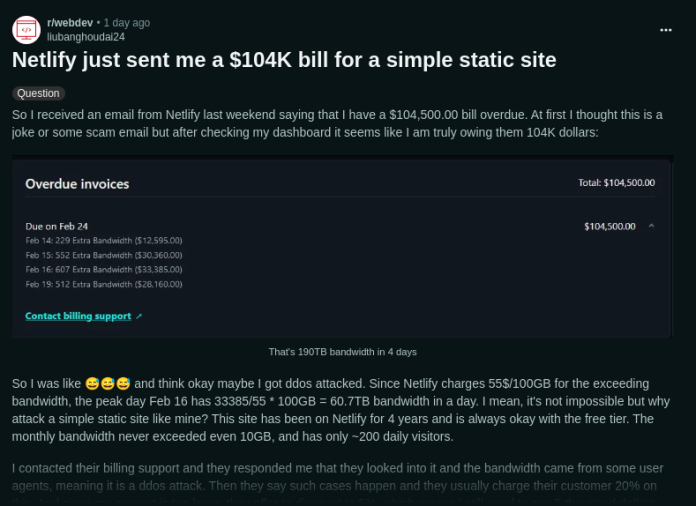Introduction

In the current era of web development, managing costs and ensuring the security of websites have become paramount. A recent incident that sparked significant concern among the web development community involved a Netlify user receiving a staggering $104,500 bill for their service. This incident raises questions about cost management on cloud platforms and how to protect websites against threats.
The root cause of this astronomical bill was a DDoS attack, leading to an unusually high consumption of bandwidth. In the digital age, DDoS attacks are not uncommon, but what stands out is the lack of proactive protection measures from hosting platforms like Netlify. The absence of early warnings or automatic spending limits is a major weakness, making it easy for website owners to become victims in situations like these.
An important lesson from this situation is the importance of choosing a hosting platform equipped with effective security features and cost management. Additionally, utilizing third-party services for hosting large files, such as audio or video, can also minimize the risk associated with bandwidth costs.
Following the incident, the user migrated their website to Cloudflare, reflecting the necessity of carefully selecting a hosting platform based on its protection capabilities and cost management. The story also highlights the power of the online community, where sharing experiences and support can help address complex issues and even influence the decisions of major companies.
This event serves as a reminder of the need to always be mindful of cybersecurity and cost management when using cloud services. For developers, selecting a platform with robust security features and efficient cost management is crucial to avoid similar situations in the future.

The situation concluded positively when the user confirmed that they received a bill waiver from Netlify’s CEO and support team.
Link to the original article: https://www.reddit.com/r/webdev/comments/1b14bty/netlify_just_sent_me_a_104k_bill_for_a_simple
Here are some notes on how to avoid similar situations:
Using Cloudflare
Cloudflare stands out as an excellent choice for preventing bandwidth issues and DDoS attacks as mentioned in the situation above. Cloudflare’s strength lies in its ability to provide strong protection for websites through its global content delivery network (CDN), significantly reducing the risk of DDoS attacks by distributing traffic. Moreover, Cloudflare offers both free and paid services with a variety of security and performance configuration options, including protection against common web attacks, automatic content optimization to improve page load speeds, and reduced bandwidth costs. Utilizing Cloudflare not only helps protect your website but also ensures a fast and smooth experience for end-users.
URL: https://www.cloudflare.com/
Using GitHub Pages
GitHub Pages offers a free hosting solution for static websites, based on GitHub repositories. This makes it a suitable option for deploying small projects, portfolios, or project websites that do not require a large amount of bandwidth or complex server-side features. One advantage of GitHub Pages is its simplicity in setup and deployment, along with built-in integration with GitHub’s version control tools, making content management and updates straightforward. However, to prevent DDoS attacks, users should combine GitHub Pages with external CDN services like Cloudflare to enhance protection and performance for their website.
URL: https://pages.github.com/
Regularly Monitoring Your Website
Regular monitoring of your website is a crucial practice for early detection and timely response to security or performance issues. Utilizing web monitoring tools can help capture traffic information, identify unusual behavior patterns that may indicate DDoS attacks, and monitor overall website performance. Services like Google Analytics, Jetpack for WordPress, or more professional solutions like New Relic provide in-depth and real-time insights into your website’s state. Additionally, setting up automatic alerts for specific conditions, such as spikes in traffic or loading times, enables quick reaction and damage minimization.

